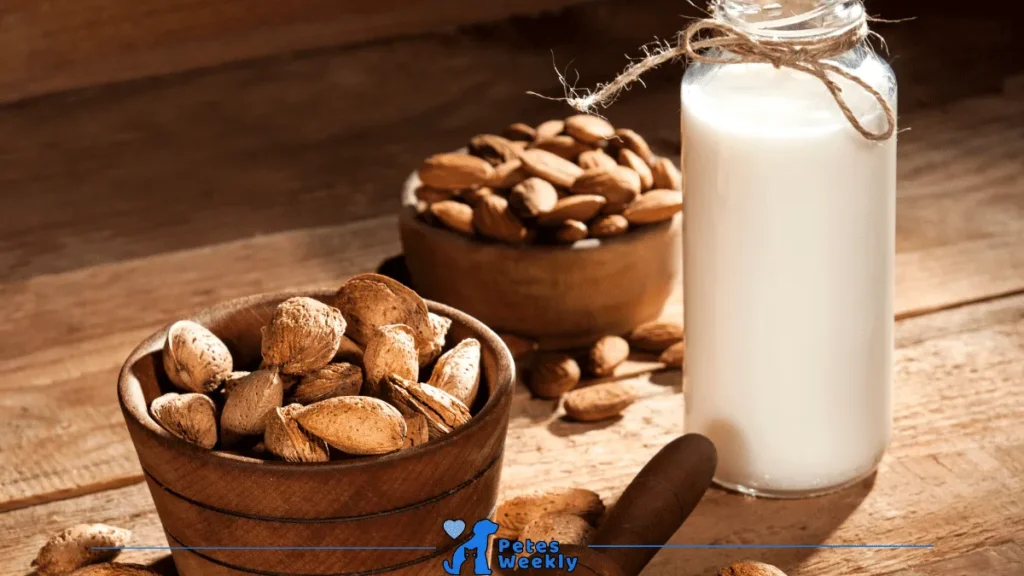Can Dogs Eat Almonds?
The answer is no; picture this: you’re snacking on some almonds, and your pup gives you those begging eyes. Can you share a couple of almonds with them? The world of dog nutrition can seem like a labyrinth. It’s chock-full of “do’s and don’ts,” often leaving pet owners scratching their heads in confusion.
Although a healthy snack for humans, almonds are a no-go for dogs. Why? They’re not toxic like some other nuts, but they can cause serious health problems for dogs. They are hard for dogs to digest, leading to upset stomachs and potential gastrointestinal distress. Almonds are high in fat, too, and can lead to unwanted weight gain and other health issues in dogs. Moreover, flavored or salted almonds are dangerous, spiking salt levels and causing salt toxicity.
Dive deep into this guide to ensure the tail-wagging member of your family stays safe and healthy. Let’s unveil the mystery, must we? Your four-legged friend’s health is worth it!
Almond and Dogs – An Overview
Types of Almonds and Their Effects on Dogs
Salted Almonds
Can you imagine relishing the crunch of salted almonds? Delicious for us, yet a peril for our pups. Though not toxic, salted almonds catapult the salt levels in a dog’s body, spiraling into salt toxicity. This sudden surge can wreak havoc, increasing water retention in dogs and causing many health issues, including water retention and high blood pressure.
Raw Almonds
Picture the natural allure of raw almonds. Seems harmless, right? But even raw almonds pose a threat to our canine companions. Despite their natural state, these almonds aren’t a natural fit for a dog’s diet. They’re hard nuts to crack, making them difficult for dogs to digest. This could lead to gastrointestinal distress, including upset stomachs and potential intestinal blockage, leaving your dog in discomfort and pain.
Bitter Almonds
Bitter almonds? The name alone signals a warning. These almonds might contain traces of cyanide, making them particularly dangerous for dogs to ingest. Even a single almond can cause signs of distress like vomiting and diarrhea, demanding immediate veterinary care to mitigate severe health risks, including liver damage and failure. It’s a clear and pressing danger, proving almonds, in any form, aren’t worth the risk for our furry friends.
Ensure your dog’s snack time is a treat, not a trick with potential health problems. Steer clear of almonds and opt for alternatives, keeping the tail wagging and the troubles at bay!
Why are Almonds Considered Toxic to Dogs?
Almonds might taste good, but they could be more friendly for our furry pals. These nuts can be tough for dogs to digest, leading to upset stomachs and gastrointestinal distress. And here’s a scary term – aflatoxin. It’s a poison that can lead to serious health problems for dogs, like aflatoxin poisoning, liver damage, and even liver failure.
Symptoms of Almond Poisoning in Dogs
If your pup munches on an almond, watch out for signs of trouble. Signs of aflatoxin poisoning are no joke. We’re talking about vomiting, lethargy, and loss of appetite. The trouble isn’t with whole almonds. Even almond butter or almond flour can be harmful, so keeping all almond products out of paw’s reach is best.
Long-Term Dangers and Health Risks
And it doesn’t stop at immediate symptoms. We’re looking at long-term health risks, too. Eating almonds can lead to chronic liver damage and other health issues, like weight gain and pancreatitis. Even a couple of almonds now and then is a big no-no. No matter how much they beg for that occasional treat, it’s not worth the risk. Better safe than sorry, right?
In case your dog eats almonds, don’t wait. Call your veterinarian and make an appointment right away. Each dog reacts, and even a small amount of almond can cause serious problems. It’s all about keeping our beloved dogs happy, healthy, and almond-free!

What to Do if Your Dog Eats Almonds
Your dog snagged a bag of almonds off the counter; what do you do? Panic and confusion are common, but knowing the steps can be a lifesaver.
Immediate Steps and Consultation
First, check on your dog for signs of distress like vomiting or lethargy. Don’t wait for symptoms to worsen. Call your veterinarian or an emergency pet poison hotline. Even if your dog isn’t presenting any signs of choking or an obstruction, almonds can still cause upset stomachs, intestinal blockage, and other issues, so professional consultation is necessary. Your veterinarian will guide you based on the amount and type of almonds ingested and your dog’s size, breed, and health.
Prevention and Education
But how about making sure this almond scare doesn’t happen again? Prevention is key. Educate everyone in the household about the risks associated with dogs, almonds, and other nuts like macadamia and walnuts. Store these nuts, whether salted almonds, raw almonds, or bitter almonds, out of your dog’s reach. Consider other dog-safe treat alternatives for your pup. A spoonful of peanut butter (ensure it doesn’t contain xylitol) or formulated dog treats can be a much safer snack for your pet. Stay informed and keep your pet protected.
Your dog’s health is paramount, so let’s keep those almonds and other hard nuts away from our four-legged friends. A well-informed dog owner proactively protects their beloved pet’s health and well-being.
Nuts – Which Ones Dogs Can Eat?
Knowing which ones are safe for your pup is crucial in the bustling world of nuts. Peanuts and cashews? A thumbs up in moderation. But hang on! Almonds, black walnuts, and macadamia nuts are a big no-no for dogs. Even a small amount of almond can spell trouble. So, always double-check with your vet before letting your dog crunch on new treats. It’s better to be on the safe side than sorry!
Other Toxic Foods Dogs Should Not Eat
Aside from almonds and certain nuts, other foods should be kept off your dog’s plate. Chocolates, grapes, and onions are downright dangerous. They can cause abdominal pain, vomiting, and even more serious health issues. Keep these foods away to ensure your pet stays happy and healthy.
- Chocolate: This may lead to vomiting, dehydration, and serious issues.
- Grapes/Raisins: Known to cause kidney failure in dogs.
- Onions/Garlic: Can cause anemia and significant gastrointestinal distress.
Alternative Treats for Dogs
Craving safer snack options for your dog? Consider treats like carrot sticks or apple slices (minus the seeds). These treats are tasty and pack a nutritional punch without the health risks of almonds and other toxic foods. Or how about a spoonful of peanut butter? Make sure it’s free from xylitol. Healthy and delightful treats ensure your furry buddy is wagging its tail in joy and tip-top shape!
Can Dogs Eat Almond Butter or Almond Milk?
It’s a question that’s tickling the minds of many pet owners. Let’s delve in and clear the air, must we?
When it comes to almond butter or almond milk, proceed with caution. They’re not as toxic as a bag of almonds, but they’re not risk-free either. Almond butter’s high-fat content could stir up pancreatitis or weight issues in dogs. Got flavored almond milk on your mind? Think twice. The additives in it aren’t doing your furry friend any favors.
Pros and Cons
Pros:
- Dogs might find almond butter or almond milk tasty, giving them a pleasant treat experience.
Cons:
- What is the fat content in almond butter? A tad too high, making it a challenge for dogs to digest, opening doors to health problems like pancreatitis and weight gain.
- Beware of additives! Almond milk and almond butter might house elements like xylitol or a heavy dash of salt, which don’t sit well with dogs.
- After consuming these almond-based products, stomach woes and other digestive hiccups could spring up in dogs.
- Like us, dogs could be allergic to almonds, leading to unwanted allergic reactions.
Safe Alternatives
Thinking about the cons, it’s better to play it safe. How about some good ol’ peanut butter (xylitol-free) or a smidgen of unsweetened coconut milk? These alternatives keep the tail wagging and ensure your dog is barking up the right tree, health-wise. When the clouds of doubt hover, a quick chat with your vet can set the course straight, guaranteeing your dog’s treats are clean, safe, and sound.
Key Takeaways
We learned a lot about dogs and almonds in this post. It’s clear that almonds, in any form, are not the best snack for our furry friends. They can cause tummy troubles and other serious health issues. It’s also a good idea to be cautious with almond milk and butter. Safety comes first, so let’s keep those almonds out of paw’s reach!
Conclusion
To wrap things up, let’s keep those almonds and other nutty snacks away from our dogs. While they might seem harmless, it’s better to be safe than sorry. There’s a world of other treats and foods that are delicious and safe for our pups. And when in doubt, it’s always best to check in with the vet. They know what’s up regarding keeping our pets happy and healthy!
FAQ
Are all types of almonds toxic to dogs?
No, but all kinds, especially bitter almonds, can cause gastrointestinal distress and other issues.
What are the symptoms of almond poisoning in dogs?
Symptoms include vomiting, diarrhea, and signs of aflatoxin poisoning, such as liver damage and failure.
Can dogs have almond milk or almond butter?
They can but with caution due to high-fat content, potential additives, and possible digestive issues.
How to prevent dogs from eating almonds?
Ensure almonds and almond products are stored, and educate the household about these potential hazards.
What are other nuts or foods dogs should not eat?
Avoid macadamia nuts, walnuts, chocolates, grapes, onions, and foods containing xylitol, as they’re toxic to dogs.
Sources
- American Kennel Club: “Nuts Dogs Should and Should Not Eat”
- Petco: “Can Dogs Eat Almonds?”
- Vetstreet: “Why Can’t Dogs Eat Almonds”
